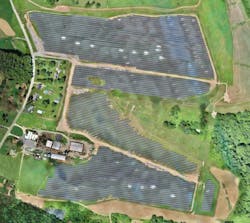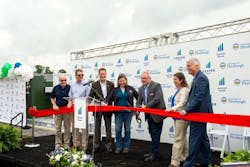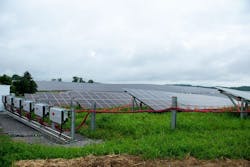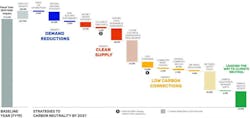University of Pittsburgh Case Study: Shaping a Sustainable Future Through University-Based Solar Projects
Responsibly addressing the causes and impacts of climate change includes balancing equity, environment, and economics. While corporations, private developers, and governments have different missions, stakeholders, and revenue sources than higher education institutions, stakeholders of all organizational types expect responsible climate and community-friendly operations and partnerships.
Reflecting on the need for transparent, measurable progress, the University of Pittsburgh clearly established sustainability and climate goals as part of our 2018 Sustainability Plan and 2022 Climate Action Plan.
These goals focus on:
- Reducing energy use intensity by 50% by 2030 (below baselines).
- Producing or procuring 50% of the University’s electricity from renewable sources by 2030 and 100% by 2037.
- Achieving carbon neutrality by 2037.
The details of moving from intention to action are where the most important decision-making is done.
While clean energy sources are a clear priority of our climate strategy, local installations close to our four campuses are not numerous or substantial. With new wind power proving difficult to site in Pennsylvania for over a decade, local solar represents a renewable power source with immediate and long-term benefits for the University, the surrounding communities, and the environment.
In scanning market options back in 2018, a local solar opportunity materialized to help advance our goals.
With the help of our solar development partner Vesper Energy, the University of Pittsburgh successfully launched the Gaucho Solar project, which has become a testament to the University’s commitment to sustainability and innovation.
Built on 68 acres on the border of Findlay Township (Allegheny County) and Independence Township (Beaver County), Gaucho Solar is the largest solar project in Southwestern Pennsylvania to date — and one of the largest solar projects in Western Pennsylvania. With approximately 55,000 solar panels generating electricity just 25 miles from our Pittsburgh campus, Gaucho Solar contributes daily to the University’s sustainability and climate action goals.
As the single largest contributor to the University’s locally generated renewable power, the Gaucho Solar project also serves as a model for other institutions seeking to embrace renewable energy solutions.
Delivering a project of this scale across two municipalities, supply chain constraints, and a pandemic wasn’t easy, but the University of Pittsburgh’s best practices for developing Gaucho Solar in partnership with Vesper Energy can serve as a roadmap for educational institutions interested in advancing renewable projects with co-benefits.
Identifying the Right Partners
When expanding renewable electricity procurement became a priority, University stakeholders started considering various project options -- and a strong development partner and new installations close to campus quickly topped our request list.
The University's interest was immediately piqued when Vesper Energy showed us the Gaucho Solar proposal in 2018. In addition, Vesper Energy’s solar development experience and commitment to renewable energy helped the partnership advance to the next stage.
As a result, the June 2020 public announcement of the University of Pittsburgh’s strategic partnership with Vesper Energy was predicated on the following business practices:
- Seamless execution and risk mitigation for the project, including navigating regulatory frameworks.
- A proven track record of successful solar projects.
- Experience developing projects in the PJM market, including an understanding of Pittsburgh and Pennsylvania energy landscapes.
- Successful implementation of cutting-edge technologies.
- Dedication to environmental stewardship, including stormwater management and pollinator-friendly landscaping.
- Strong partnership with the landowners hosting the project.
- Dedication to community engagement, including meaningful collaboration with stakeholders.
- Willingness to partner on faculty research and student engagement projects.
The Gaucho Solar collaboration allowed the University and Vesper Energy to embody our values while leveraging each organization’s strengths. Working together helped advance our sustainability goals while balancing and addressing our academic mission, pursuing equitable outcomes, and helping create economic resilience for the University and our surrounding communities.
Bringing the Project to Life
From proposal to ribbon-cutting, various stakeholders from the University of Pittsburgh and Vesper Energy helped create and energize the Gaucho Solar project. University Facilities, Engineering, Grounds, Legal, and Sustainability leads worked directly with Vesper’s Development, Origination, and Engineering teams.
While considering the partnership and negotiating the details of the 20-year Power Purchase Agreement (PPA) was an important process, it also helped hone our framework for ongoing collaboration and guided the project's implementation trajectory.
Expanding Project Impact
As the largest contributor of renewable power in Southwestern Pennsylvania, the Gaucho Solar project serves as a model for other organizations and institutions seeking to embrace renewables. Given Gaucho’s location less than 25 miles from our Pittsburgh campus, the University has opportunities to partner with Vesper to use the site for faculty-student research and renewable energy experiential learning.
Helping University students and other stakeholders experience solar at the 20 MW scale has already helped transform local mindsets about what’s possible for solar in Pennsylvania – and shape both the current and next generation of sustainability leaders.
Focusing just on the land on which Gaucho Solar sits, Vesper and the University partnered to establish a sustainable ecosystem that benefits the surrounding communities. Vesper installed pollinator-friendly landscaping, which fosters habitats for bees, butterflies, and birds. This shared use promotes biodiversity, supports local agriculture, and exemplifies the University’s and Vesper’s commitments to environmental stewardship and community engagement.
Globally, the Gaucho Solar project also helps the University reduce carbon emissions by providing resilient, affordable, clean energy. Having local renewable electricity generation also contributes to a greener electricity grid in Pennsylvania, reducing local air pollutants by nearly 15,500 metric tons every year and contributing to a healthier and more sustainable future for all at a scale not previously demonstrated in Southwestern Pennsylvania.
A Blueprint for Sustainable Partnerships
The University of Pittsburgh is extremely proud to have played a critical role in helping bring this largest solar farm in Southwestern Pennsylvania to fruition. We hope the Gaucho Solar project can serve as a roadmap for other universities and organizations embarking on similar ventures to partner on, procure, and facilitate renewable energy ventures.
While just 20 MW in size, the Gaucho Solar project is the largest contributor to the University’s progress in procuring renewable electricity, equivalent to roughly 18% of our Pittsburgh campus’s annual electricity usage, and addressing our academic mission while helping create economic resilience in the Pittsburgh region.
By prioritizing local engagement and leveraging expert partners, Universities can be pivotal in advancing renewable energy adoption and fostering sustainable communities.
The Gaucho Solar project exemplifies the opportunities available when academia, industry, and community partner with shared values. More specifically, the University of Pittsburgh and Vesper partnership demonstrates the University’s commitment to not just purchasing renewable electricity but purchasing local renewable electricity that has cascading local economic and environmental benefits, helps reduce local and global air pollutants, and creates learning opportunities for faculty and students.
We are excited for other organizations and homeowners to follow our lead and join the millions of rooftop and utility-scale solar installations across the U.S., using the sun to power our places and fuel our inspiration.
Click to Enlarge Image
Gaucho Solar is currently a 20-year commitment – the equivalent of avoiding 15,452 metric tons of greenhouse gas emissions (GHG), which is about 9% of our FY22 GHG emissions.
About the Expert
Dr. Aurora Sharrard is the inaugural Assistant Vice Chancellor for Sustainability at the University of Pittsburgh, guiding cross-departmental sustainability staff and University-wide sustainability strategy, activities, and partnerships.










